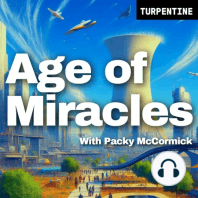30 min listen
E3: Nuclear Economics
ratings:
Length:
83 minutes
Released:
Nov 3, 2023
Format:
Podcast episode
Description
If we just tried to implement and scale the technology we have today for large scale nuclear reactors, with no innovation on reactor designs or business models, could we do it? How hard (or expensive) could it really be?
Turns out, this question gets to the heart of the paradox of nuclear power in America: this incredible energy source, which has the potential to be the cheapest and cleanest of all, is currently the most expensive to build by orders of magnitude. To get more nuclear power on the grid as fast as possible, we need to dramatically change the economics of new reactors. The complex economics stem from three main intertwined issues: construction, financing, and regulation.
In this episode, Packy and Julia dig into the nitty gritty of these issues and look at what it actually takes to build a plant in America (and around the globe). They point out some opportunities to improve key problem areas like financing and workforce deployment. And they talk with nuclear experts, government financing officials, investors, and entrepreneurs who are all trying to figure out: how do we fix the economics of building large scale nuclear reactors?
Some of the answers include innovations in financing and possible regulatory changes – and some get more creative, like floating shipyards and repurposing old coal plants. Tune in to go deep on the economics of nuclear power plants.
Thank you to this episode’s guests:, Bret Kugelmass, Mark Nelson, Josh Wolfe, James Krellenstein, Emmet Penney, Julie Kozeracki, and David Ulevitch.
Huge thank you to our sponsors:
Secureframe: the only compliance automation platform with AI capabilities that help customers speed up cloud remediation and security questionnaires. Get 20% off your first year of Secureframe by mentioning "Age of Miracles" during your free demo.
Pilot.com: accounting, CFO, and tax services that are designed with flexibility and scalability in mind. To get 20% off your accounting bill for the first 6 months, go to https://pilot.com/packy
Clean Air Task Force
For the full list of resources referenced in this show: https://ageofmiracles.co/
Subscribe to Not Boring to get weekly doses of tech and business strategy, straight to your inbox: https://www.notboring.co/
Follow our hosts:
Packy McCormick on Twitter and LinkedIn
Julia DeWahl on Twitter and LinkedIn
Timestamps:
(00:00) Why is building new nuclear in the U.S. so expensive?
(07:40) How nuclear fission and nuclear plants work
(16:50) Nuclear power plant economics
(29:05) So, how do we fix the economics of building nuclear power plants?
(41:45) What's actually holding industry executives back from ordering more projects?
(48:12) Serialized construction and developer models
(58:50) Why is nobody talking about regulation?
(1:08:30) Acceleration through federal and popular support
(1:16:32) Recap
This show is produced and distributed by Turpentine, a network of shows and other media properties, where experts talk to experts about tech, business, culture, and more.
Credits: Nancy Xu produced this season of Age of Miracles. Audio editor: Justin Golden. Video editor: Jake Salyers. Executive producers: Amelia Salyers, Packy McCormick, and Erik Torenberg.
Turns out, this question gets to the heart of the paradox of nuclear power in America: this incredible energy source, which has the potential to be the cheapest and cleanest of all, is currently the most expensive to build by orders of magnitude. To get more nuclear power on the grid as fast as possible, we need to dramatically change the economics of new reactors. The complex economics stem from three main intertwined issues: construction, financing, and regulation.
In this episode, Packy and Julia dig into the nitty gritty of these issues and look at what it actually takes to build a plant in America (and around the globe). They point out some opportunities to improve key problem areas like financing and workforce deployment. And they talk with nuclear experts, government financing officials, investors, and entrepreneurs who are all trying to figure out: how do we fix the economics of building large scale nuclear reactors?
Some of the answers include innovations in financing and possible regulatory changes – and some get more creative, like floating shipyards and repurposing old coal plants. Tune in to go deep on the economics of nuclear power plants.
Thank you to this episode’s guests:, Bret Kugelmass, Mark Nelson, Josh Wolfe, James Krellenstein, Emmet Penney, Julie Kozeracki, and David Ulevitch.
Huge thank you to our sponsors:
Secureframe: the only compliance automation platform with AI capabilities that help customers speed up cloud remediation and security questionnaires. Get 20% off your first year of Secureframe by mentioning "Age of Miracles" during your free demo.
Pilot.com: accounting, CFO, and tax services that are designed with flexibility and scalability in mind. To get 20% off your accounting bill for the first 6 months, go to https://pilot.com/packy
Clean Air Task Force
For the full list of resources referenced in this show: https://ageofmiracles.co/
Subscribe to Not Boring to get weekly doses of tech and business strategy, straight to your inbox: https://www.notboring.co/
Follow our hosts:
Packy McCormick on Twitter and LinkedIn
Julia DeWahl on Twitter and LinkedIn
Timestamps:
(00:00) Why is building new nuclear in the U.S. so expensive?
(07:40) How nuclear fission and nuclear plants work
(16:50) Nuclear power plant economics
(29:05) So, how do we fix the economics of building nuclear power plants?
(41:45) What's actually holding industry executives back from ordering more projects?
(48:12) Serialized construction and developer models
(58:50) Why is nobody talking about regulation?
(1:08:30) Acceleration through federal and popular support
(1:16:32) Recap
This show is produced and distributed by Turpentine, a network of shows and other media properties, where experts talk to experts about tech, business, culture, and more.
Credits: Nancy Xu produced this season of Age of Miracles. Audio editor: Justin Golden. Video editor: Jake Salyers. Executive producers: Amelia Salyers, Packy McCormick, and Erik Torenberg.
Released:
Nov 3, 2023
Format:
Podcast episode
Titles in the series (100)
If I Ruled the Tweets by "Age of Miracles"
